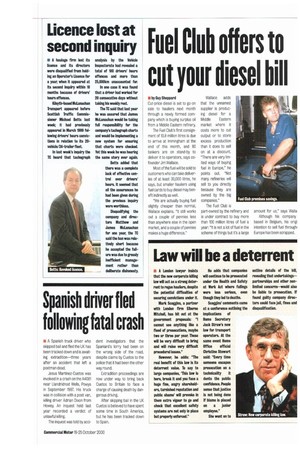Law will be a deterrent
Page 9

If you've noticed an error in this article please click here to report it so we can fix it.
a A London lawyer insists that the new corporate killing law will act as a strong deterrent to rogue hauliers, despite the potential difficulties of securing convictions under it
Mark Scoggins, a partner with London firm Elborne Mitchell. has hit out at the government proposals: "I cannot see anything like a flood of prosecutions, maybe two or three per year. These will be very difficult to bring and will raise very difficult procedural issues."
However, he adds: "The real benefit of this law Is its deterrent value. To say to large companies, This law is here, break it and you face a huge fine, angry shareholders, tarnished reputation and public shame' will provoke in them extra vigour to go and chock that excellent safety systems are not only in place but properly enforced." Ile adds that companies will continue to be prosecuted under the Health and Safety at Work Act where failings were less serious, even though they led to deaths.
Scoggins' comments came at a conference outlining the implications of Home Secretary Jack Straw's new law for transport operators. At the same event Home Office official Christine Stewart said: "Every time someone escapes prosecution on a technicality it dents the public confidence. People sense that justice is riot being done If blame is placed on a junior employee."
She went on to outline details of the bill, revealing that undertakings— partnerships and other nonlimited concerns—would also be liable to prosecution. If found guilty company directors could face jail, fines and disqualification.












































































































